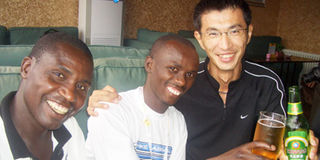Japanese connection pays off for champion

Samuel Wanjiru centre, Steven Mayaka and Fuchiwaki Katsushi (coach) enjoy beer after wining Olympic marathon at the Nest on Sunday. Photo/MOHAMMED AMIN.
What you need to know:
- Fuchiki’s game plan worked out very well as Wanjiru was already eight seconds ahead of his planned schedule
- Kenya’s previous best performances in the Olympics marathon race were also by Japan-based runners Douglas Wakiihuri and Eric Wainaina
At 3.00 pm on Saturday afternoon, three gentlemen sat at an isolated table at the UBC Coffee House next to the Beijing Olympic Village, plotting what would turn out to be a very important chapter in Kenyan history.
Stephen Mayaka, Katsushi Fuchiki and Samuel Wanjiru could be mistaken for any other group of friends out on a meeting date over coffee but the trio was in final preparations on how Kenya – a country blessed with an abundance of sub two hours 10 minutes marathon runners - would win its first Olympic marathon gold medal.
And this Wanjiru did in an Olympic record time of two hours, six minute and 32 seconds, an improvement on Spain’s Carlos Lopez’s (2:09.21) set at the 1984 Los Angeles Olympics.
Lopez was among journalists and officials who waited to meet, interview and congratulate the world half marathon record holder for clinching Kenya’s first marathon gold and in an Olympic record time.
“Congratulations Wanjiru, you are a very strong runner,” Lopez told his heir. Morocco’s Jaouad Gharib won the silver with Ethiopian Tsegay Kebede taking the bronze.
Kenya’s London Marathon champion, Martin Lel, finished fifth in 2:10.24 while the third Kenyan runner, world champion Luke Kibet, dropped off halfway the race with stomach cramps.
Kenya’s previous best performances in the Olympics marathon race were also by Japan-based runners Douglas Wakiihuri and Eric Wainaina who won silver medals at the 1988 and 2000 Games in Seoul and Sydney respectively.
Mayaka and Fuchiki were among a group of about 25 Japanese fans, coaches and track and field managers who had come to follow Wanjiru, the Kenyan star who has been resident in Japan for the last six years.
He ran for the Toyota Kyushu team in Fukuoka recently after completing his secondary school education at the Sendai Ikue High School in Sendai prefecture (province).
Fuchiki is Wanjiru’s personal coach while Mayaka, who has been living in Japan for the last 20 years and currently an international athletes’ representative.
“We discussed that if the pace was slow, then he would go fast because if he ran too slowly, then the pack would catch up with him and could be difficult for him to shake them off,” said Mayaka.
“He started the first five and 10 kilometres fast. His coach also advised him to assess the opposition. It’s hot and humid in Beijing and that’s why it was important for Wanjiru to run fast in the lead group so that by the time the temperatures rise, it would be difficult for the chasing pack to get him.”
Fuchiki’s game plan had worked out very well as Wanjiru was already eight seconds ahead of his planned schedule of 15 minutes and five seconds and he accelerated, running 29:25, a huge 45 seconds ahead of his scheduled 10-kilometre split time.
Thanks to global satellite tracking systems and mobile telephone technology, Fuchiki was able to get the five-kilometre updates on Wanjiru’s progress from a team of analysts in Japan.
His five-kilometre splits in the historic race for Kenya were: five kilometres (covered in 14 minutes, 52 seconds), 10km (second five kilometres covered in 14.34), 15km (15.11), 20km (14.33), 25km (14.48), 30km (15.16), 35km (15.23) and 40km (15.17).
“It was important initially for Wanjiru to stay with the lead pack to assess the other runners but he did extremely well by taking over the race early,” said Fuchiki.
Silver medallist Gharib accepted defeat and paid glowing tribute to Wanjiru for his resilience.
“It was incredible, these conditions,” the Moroccan said. “There were several attempts to drop me completely but I fought on…I wanted to be the first but I’m the second. That’s sport and I’m happy with my result.”
The Moroccan’s game plan was not too different from Wanjiru’s. “I followed my plan. At first I was in the lead pack, a few metres before the finish line I started to speed up and overtake the leaders in case I lagged behind.”
Ethiopia’s Kebede regretted his inconsistent pace, saying the Kenyan game plan worked out well in keeping him at bay.
“The Kenyan athletes sometimes ran fast, but sometimes they ran slowly. I think that was the tactic they used and that was the main problem for me,” Kebede who overtook his tiring team-mate Deriba Merga with just 200 metres to go in the stadium, said.
Kibet, who won the World Championships title in Osaka last year, complained of stomach problems.
“I had a problem with my stomach. I started to feel it from the 15th kilometre. When I came to Beijing, I felt a lot better but the stomach was a big problem. It also gave me bad headaches,” Kibet said.
Lel was also not 100 percent fit coming into the race after battling with malaria and typhoid in the course of his training.
“I was happy to be selected to the Kenyan team and that’s why I came here and had to forgo the big city marathons,” Lel said.
“I struggled with the illness for some time and when we got to the 30-kilometre mark, I told Wanjiru to go for it and I’m so happy that he won the gold for Kenya.”
Lel – who last year became the first man to win the London and New York marathons in the same year - said he would first have a planning meeting with his Italian coach Claudio Berardelli to chart his plan for the next big marathon.




